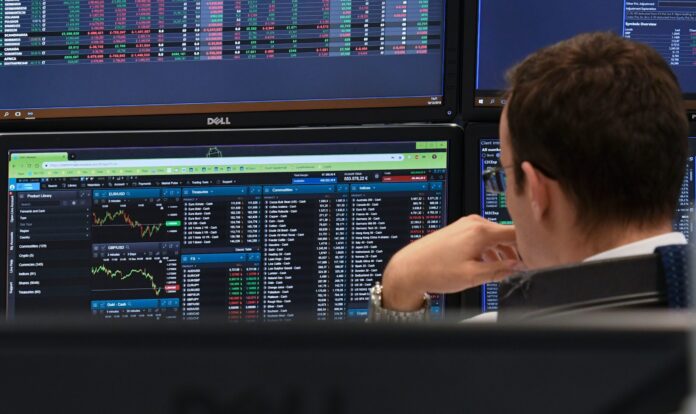Asian shares slipped from six-month high on Wednesday as investors took profits ahead of a policy decision by the U.S. Federal Reserve expected to shed more light on its interest rate plans for the rest of the year.
MSCI’s broadest index of Asia-Pacific shares outside Japan dropped 0.4 per cent, led by losses in Australia and South Korea.
Japan’s Nikkei was little changed while mainland Chinese shares fell 0.5 per cent.
Wall Street shares were narrowly mixed on Tuesday, with the S&P 500 losing 0.01 per cent and the Nasdaq adding 0.12 per cent.
Some market players said sale was triggered by a report of U.S. concerns that China is pushing back against American demands in trade talks.
Still, on the whole, many market players held on to hopes of a trade deal between Washington and Beijing as officials from both sides remained locked in negotiations.
U.S. Trade Representative Robert Lighthizer and Treasury Secretary Steven Mnuchin plan to travel to China next week for another round of trade talks with Chinese Vice Premier Liu He, a Trump administration official said on Tuesday.
“China is eager to come to an agreement so I’m not too worried. As long as they are holding meetings, many things will work out,” said Wang Shenshen, strategist at Tokai Tokyo Research Center.
Confidence among Asian companies remained near three-year lows in the first quarter as the U.S.-China trade dispute dragged on, pulling down a global economy that is already on a downward path, a Thomson Reuters/INSEAD survey found.
Companies in the survey listed the global trade war as the top business risk, followed by higher interest rates and the slowing Chinese economy.
The Fed is widely expected keep rates steady later in the day, putting the main market focus on its policymakers’ rate projections for the next few years.
Since the beginning of year, Fed Chairman Jerome Powell has said the central bank would be patient – interpreted as code word for holding off on a rate hike – on signs of slowing economic growth in the United States and many parts of the world.
Financial markets have gone even further by pricing in a rate cut this year. Fed funds futures point to about a 30 per cent chance of a cut by the end of year.
The Fed is also expected to lay out a plan to stop shrinking its 4 trillion dollars balance sheet, or so-called quantitative tightening.
Many policy makers have suggested the Fed is likely to conclude the process and stabilize its bond holdings by the end of this year.
“I think market consensus centres around an end in September but we expect the Fed to end its balance sheet rolloff in June, at around 3.85 trillion yen, based on our calculations on the amount of excess reserves the Fed will need,” said Shuji Shirota, head of macroeconomic strategy at HSBC Securities in Tokyo.
Expectations of a more cautious Fed have dented the U.S. dollar, which has already been under pressure this year after Powell all but signaled a pause to the tightening cycle at the previous meeting.
The dollar’s index against a basket of six major currencies hit 2 1/2-week low of 96.288 on Tuesday and last stood at 96.465.
The euro traded little changed at 1.1354 dollar, near Tuesday’s two-week high of 1.1362 dollar.
The dollar fetched 111.61 yen, up slightly on the day but below Friday’s nine-day high of 111.90.
The Australian dollar dipped 0.2 percent to 0.7071 dollar, as the country’s bond yields extended their breakneck decline to multi-year low on expectations of a rate cut in Australia.
It was not helped by a six per cent fall in China’s iron ore prices on expectation of higher supply as Vale SA is set to resume work at its largest iron ore mine in Minas Gerais state.
The British pound remained hostage to headlines on Brexit.
Prime Minister Theresa May is expected to ask the European Union to delay Brexit by at least three months after her plan to hold a third vote on her deal was thrown into disarray by a surprise intervention from the speaker of parliament.
May had earlier warned parliament that if it did not ratify her deal, she would ask to delay Brexit beyond June 30, a step that Brexit’s advocates fear would endanger the entire divorce.
On the other hand, the EU’s Chief Negotiator, Michel Barnier, had said an extension would only make sense if it increased the chances of May’s deal being ratified by Britain’s House of Commons.
Sterling last stood flat at 1.3265 dollar, off its nine-month peak of 1.3380 dollar hit a week ago.
Oil prices held close to four-month high on expectations that OPEC would continue production cuts through the end of the year and after data from the American Petroleum Institute (API) showed a surprise draw-down on crude inventories.
U.S. West Texas Intermediate (WTI) futures stood flat at 59.02 dollars per barrel after touching their highest since November at 59.57 dollars on Tuesday.




